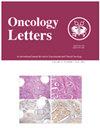癌症干细胞标记物的表达对肝细胞癌不良后果的诊断价值及其与预后的关系:贝叶斯网络荟萃分析
IF 2.2
4区 医学
Q3 ONCOLOGY
引用次数: 0
摘要
癌症干细胞(CSC)标记物的表达会对肝细胞癌(HCC)患者的生存预后产生不利影响,但目前尚不清楚哪种癌症干细胞标记物对HCC患者的生存预后和诊断价值指标具有最佳预测效果。因此,本研究进行了一项网络荟萃分析,以比较几种癌干细胞标记物的表达对HCC患者的预后和诊断价值,并找出最有效的癌干细胞标记物。该网络荟萃分析纳入了2013年1月1日至2023年11月17日期间在PubMed、Embase、Elsevier和The Cochrane Library数据库中检索到的有关HCC患者CSC阳性标记物与总生存(OS)率、无病生存(DFS)率、无复发生存(RFS)率、复发率、分化、微血管侵犯和转移的相关研究。诊断准确性研究质量评估-2工具用于评估研究质量,R(4.3.1版)、Stata(15.0版)和Review Manager(5.3版)用于分析。共纳入 37 项研究,涉及 3,980 名参与者。对于HCC患者,细胞角蛋白19(CK19)和上皮细胞粘附分子(EpCAM)同时阳性是预测OS率的最强指标[累积排名曲线下表面(SUCRA),78.65%],角蛋白 19(K19)阳性是 RFS 和 DFS 率的最强预测指标(SUCRA,分别为 98.93% 和 84.95%),EpCAM 和分化簇(CD)90 同时阳性是复发率的最强预测指标(SUCRA,5.61%)。此外,CD56、K19 和 CD133 阳性分别对分化不良[优越性指数,7.4498;95% 置信区间(CI):0.3333,13.0000]、微血管侵犯(优越性指数,8.4777;95% CI:0.2308,17.0000)和转移(优越性指数,5.6097;95% CI:0.3333,11.0000)具有最佳诊断效果。总之,没有一种 CSC 标记对 HCC 患者生存预后和诊断的所有指标都具有最佳预测效果。在生存预后方面,CK19和EpCAM同时阳性对OS率的预测作用最强,表明HCC患者的OS率较低;K19阳性对RFS率和DFS率的预测作用最强,表明HCC患者的RFS率和DFS率较低;EpCAM和CD90同时阳性对复发率的预测作用最强,表明HCC患者的复发率较高。在诊断价值方面,CD56、K19 和 CD133 分别是分化不良、微血管侵犯和转移的最强预测因子。未来,需要设计良好的随机对照试验来进一步证实这些发现。本文章由计算机程序翻译,如有差异,请以英文原文为准。
Diagnostic value of expressions of cancer stem cell markers for adverse outcomes of hepatocellular carcinoma and their associations with prognosis: A Bayesian network meta‑analysis.
The expression of cancer stem cell (CSC) markers adversely affect the survival prognosis of patients with hepatocellular carcinoma (HCC), but it is not clear which cancer stem cell marker has the best predictive effect on the survival prognosis and diagnostic value indicators of patients with HCC. Therefore, the present study performed a network meta-analysis to compare the prognostic and diagnostic value of the expressions of several CSC markers for patients with HCC and to identify the most efficient CSC marker. Studies on the associations of positive CSC markers with the overall survival (OS) rate, disease-free survival (DFS) rate, recurrence-free survival (RFS) rate, recurrence rate, differentiation, microvascular invasion and metastasis in patients with HCC were included in the network meta-analysis following searches on the PubMed, Embase, Elsevier and The Cochrane Library databases from January 1, 2013 to November 17, 2023. The Quality Assessment of Diagnostic Accuracy Studies-2 tool was used to assess the quality assessment of studies, and R (version 4.3.1), Stata (version 15.0) and Review Manager (version 5.3) were used for analysis. A total of 37 studies involving 3,980 participants were included. For patients with HCC, simultaneous positivity of cytokeratin 19 (CK19) and epithelial cell adhesion molecule (EpCAM) was the strongest predictor of the OS rate [surface under the cumulative ranking curve (SUCRA), 78.65%], positive keratin 19 (K19) was the strongest predictor of the RFS and DFS rates (SUCRA, 98.93 and 84.95%, respectively), and simultaneous positivity of EpCAM and cluster of differentiation (CD)90 was the strongest predictor of the recurrence rate (SUCRA, 5.61%). In addition, positivity of CD56, K19 and CD133 had the best diagnostic efficacy for poor differentiation [superiority index, 7.4498; 95% confidence interval (CI): 0.3333, 13.0000], microvascular invasion (superiority index, 8.4777; 95% CI: 0.2308, 17.0000), and metastasis (superiority index, 5.6097; 95% CI: 0.3333, 11.0000), respectively. In conclusion, no single CSC marker possessed the best predictive effect on all indexes of survival prognosis and diagnosis of patients with HCC. In terms of survival prognosis, simultaneous positivity of CK19 and EpCAM demonstrated the strongest predictive effect on the OS rate, suggesting an association with a low OS rate in patients with HCC; positive K19 revealed the strongest predictive effect on the RFS rate and DFS rate, suggesting an association with low RFS and DFS rates in patients with HCC; and simultaneous positivity of EpCAM and CD90 had the strongest predictive effect on the recurrence rate, suggesting a high recurrence rate in patients with HCC patients. In terms of diagnostic value, CD56, K19 and CD133 were the strongest predictors of poor differentiation, microvascular invasion and metastasis, respectively. In the future, well-designed randomized controlled trials are required to further confirm these findings.
求助全文
通过发布文献求助,成功后即可免费获取论文全文。
去求助
来源期刊

Oncology Letters
ONCOLOGY-
CiteScore
5.70
自引率
0.00%
发文量
412
审稿时长
2.0 months
期刊介绍:
Oncology Letters is a monthly, peer-reviewed journal, available in print and online, that focuses on all aspects of clinical oncology, as well as in vitro and in vivo experimental model systems relevant to the mechanisms of disease.
The principal aim of Oncology Letters is to provide the prompt publication of original studies of high quality that pertain to clinical oncology, chemotherapy, oncogenes, carcinogenesis, metastasis, epidemiology and viral oncology in the form of original research, reviews and case reports.
 求助内容:
求助内容: 应助结果提醒方式:
应助结果提醒方式:


